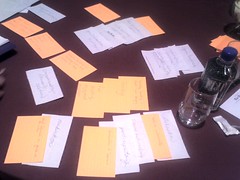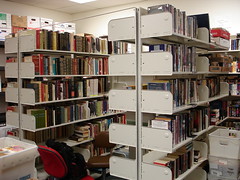 First, I’m exhausted. It was an intense two days of work in Chicago, with the SLJ Annual Leadership Summit. It was a highly interactive conference that was incredibly well organized and planned out, with some exceptional presenters and keynoters. But more to the point, it was a working conference where three groups of library media specialists and media services administrators discussed issues of school libraries today and recommended what were called critical opportunities for the field. In my group there was some questions as too what a critical opportunity was, but we sure came up with some.
First, I’m exhausted. It was an intense two days of work in Chicago, with the SLJ Annual Leadership Summit. It was a highly interactive conference that was incredibly well organized and planned out, with some exceptional presenters and keynoters. But more to the point, it was a working conference where three groups of library media specialists and media services administrators discussed issues of school libraries today and recommended what were called critical opportunities for the field. In my group there was some questions as too what a critical opportunity was, but we sure came up with some.
It is important to note that I was the only technology educator there. It is probably more accurate to say that I was the only non-librarian there, since many in attendance were quite adept at using a wide array of technologies. The ninth and tenth floors of the Drake Hotel enjoyed free WiFi thanks to some library ingenuity. Most folks were very welcoming and expressed appreciation of my short message and my blogging.
I did get pounced on at the end by a number of clawed librarians who had taken exception with some of my bloggings back during the summer. It was a warm and educational exchange, based on some blogversations I’d had around NECC time this year, about the changing nature of information and potential futures (or non-futures) of libraries and librarians. Their concern was that I was overlooking those in the field who are brilliantly adapting their information services to the emerging digital, networked, and overwhelming information landscape, and the new web — and they were certainly right about my oversight and right to express that concern.
At the end of the conference librains voted, with little round stickers, on the critical opportunities that they though were most important. Here is the list, as blogged by my new Tennessee friend, Diane Chen. I am inserting some of my own thoughts from a more purely digital information point of view. It is important to note that their task was to quickly suggest ideas, not to wordsmith them out. Also, this list is in order of votes, not a logical sequencing. This will be done on an ongoing basis through a wiki.
#10 Building Trust and Respect Recruiting Young
This was actually two items that received the same number of votes. I believe that this is important, especially in terms of coming to respect a library’s patrons, their expertise, and their publications, and the new information landscape and its various advantages — without neglecting the more scholarly sources that remain critical to educational endeavors.
#9 How are we going to level the learning playing field? Target the have-nots
Libraries do provide an invaluable service as they make information available to all spectrums. I also believe that this problem is much larger than libraries. It is a national issue that is no less critical than literacy. What does literacy mean to someone who does not have convenient access to the information. I believe that creative efforts from libraries to provide access must continue. But I also believe that the problem will not be solved until access to digital networked information is available at an arms reach to anyone, anywhere, at anytime.
#8 Include info lit in teacher preparation curricula
This is absolutely necessary, as many students are not receiving adequate instruction in these skills now. However, the concept must continue to be molded for the information age. I maintain that two things need to happen. (1) That all information literacies (the 3 Rs & Info Lit) must combine into one literacy, and (2) we call it Learning Literacy. Learning will be our way of life, so knowing how to use our information landscape to learn, will be a/THE literacy.
#7 Librarians should be partners in the ongoing assessment of student learning
I’m not sure exactly what this would look like. However, I can see how it would happen. Learning must come to look more and more like work, where students are spending a significant amount of their time constructing knowledge and producing information products that demonstrate their skills and mastery of concepts and content. I wonder if the library might become the place where students do much of that work, that it evolves into a place where information is produced as much as where information is consumed. Think Kinkos for Kids. with skilled library consultants who assist students in gaining and utilizing their learning skills to do good responsible work.
#6 The Technology
I know that this item was much more fleshed out in the original document. However, I suspect that at some point we should start looking at the technology as part of the information/learning skills. If computers and the Internet (and printers, scanners, digital cameras, etc.) become the pencil and paper of our time, then using these technologies will be synonymous with using information.
#5 Taking a leadership role in educational applications for emerging technology
As school libraries become (as many already are) the hub and spokes of their schools, libraries are the perfect point of leadership in identifying and inventing teaching and learning applications and information and communication technologies.
#4 Provide stakeholders with instructional materials, information and model school libraries to demonstrate excellence
This is the job of any professional library. However, I would see this and item five combining, such that the library becomes a primary source for information, information materials, information applications, and information technologies.
#3 Develop and embrace new models for interacting with learners using 21st century technology
Libraries and librarians are uniquely positioned and qualified to be leaders in understanding and developing the new information landscape and shaping it for continued improvement of their schools, classrooms, and the skills of their teachers and learners. There are nearly limitless ways that information and its conduits can be designed and assembled into learning engines connecting the teacher and learner to curriculum and its world.
#2 Demonstrate via use of data & evidence (to our communities) thatschool librarians and library programs pay learning dividends andimprove student achievement
As the other nine or ten items are implemented and as they evolve, a vision of libraries as valuable dividend-paying spaces will emerge automatically. It will become a visible hub and spokes for the school as students begin to be empowered learners by working the information rather than disempowered learners by sitting in their seats. As this happens, the library will be seen as where much of that empowering work takes place.
#1 Mesh library added value into educator learning environments.
This is what all the rest of these items are about, turning the school into a learning engine, whose working parts are engineered and assembled, in large part, by libraries and librarians.
technorati tags:warlick, sljsummit06, library, librarian, informationskills
Blogged with Flock
 Grant Swaim, an automotive technologies instructor here at Guilford Technical Community College just shared with me a company called, Vango Notes. It appears to be a subsidiary of Audible. They publish audio versions of textbooks by the chapter. So as students are assigned a chapter to read, many of them will pay $2.99 to Vano Notes. 😉
Grant Swaim, an automotive technologies instructor here at Guilford Technical Community College just shared with me a company called, Vango Notes. It appears to be a subsidiary of Audible. They publish audio versions of textbooks by the chapter. So as students are assigned a chapter to read, many of them will pay $2.99 to Vano Notes. 😉
 Federal Communications Commission member,
Federal Communications Commission member,  I did three presentations yesterday for Community College instructors and administrators. During a conversation about Web 2.0 and “the new shape of
I did three presentations yesterday for Community College instructors and administrators. During a conversation about Web 2.0 and “the new shape of  It seems like the last few days have been spent teaching at my computer. It started with a graduate course at Appalacian State University, with students sitting in their homes and libraries throughout western North Carolina, Mexico, and Australia. It was in a virtual worlds type environment with everyone dressed out in their avatars. I started to appear as a big red bird, but decided, instead, to take on the only av wearing a tie. He did have some spiffy dance steps.
It seems like the last few days have been spent teaching at my computer. It started with a graduate course at Appalacian State University, with students sitting in their homes and libraries throughout western North Carolina, Mexico, and Australia. It was in a virtual worlds type environment with everyone dressed out in their avatars. I started to appear as a big red bird, but decided, instead, to take on the only av wearing a tie. He did have some spiffy dance steps. I finally had time to go through the preliminary program for our
I finally had time to go through the preliminary program for our 

